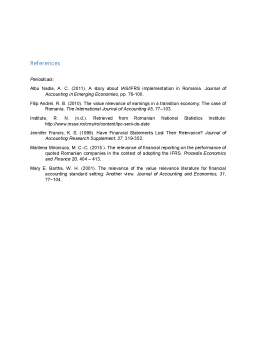Extras din referat
Abstract
My investigation explores whether value relevance of Romanian accounting information has increased in time (2011- 2017) as a result of mandatory implementation of IFRS and the latest development of Bucharest Stock Exchange. The research comprises data from 15 companies, components of BET-XT excluding financial sector. A model to measure the linear relationship between dividend adjusted returns and EPS figures was constructed and implemented in STATA. The research revealed a lower association between accounting earnings and stock returns than was previously found by Filip & Raffournier (2010). Excluding outliers from the analysis yields a higher association, but without exceeding the levels reported by previous studies.
Introduction & literature review
This research attempts to measure if value relevance of accounting data increased when an accounting regulation directed mainly towards the needs of the State and creditors is replaced by a set of highly demanding investor-oriented standards.
The value relevance of accounting data is defined as “the ability of financial statement information to capture or summarize information, regardless of sources, that affects share values” (Francis & Schipper, 1999).
Although extensive work has been done in the field of value relevance there still is a need for updated results that can confirm the following statement: accounting earnings are a significant factor for stock valuation. The case of Romanian equities was thoroughly studied by Filip & Raffournier (2010), they used data from 1998 to 2004, tactfully adjusting for inflation, finally concluding that the association of earnings and market returns is comparable to levels reported by studies conducted on more mature markets. The adjustment for inflation was mandatory giving the hyperinflationary nature of the Romanian economy during that period, therefore it is a great opportunity to reinvestigate the association with stable input. From 2012 inflation reached a maximum of 4.0% in 2013 gradually decreasing afterward entering in the deflation zone. (INSSE,2018)
Listed companies begun the implementation of IFRS as of FY2012 having the obligation to restate FY2011 financial figures according to IFRS. Although researchers are not fully convinced weather in Romania implementation of IFRS is fully understood and implemented, but still there is proof that BSE experienced increase in foreign investment as a consequence of the adoption (Albu et al., 2011).
This kind of transition from local GAAP to IAS, was monitored by Barth., Wayne Landsman and Lang (2007) at an international level. Their findings suggest that IAS firms have higher accounting quality than firms that do not apply IAS and they observed a higher association of accounting amounts with share prices and returns.
Marilena Mironiuc et al., (2015) investigated the value relevance of the net income (pre-IFRS, 2011, and post-IFRS, 2012) and of the comprehensive income (post-IFRS, 2012) as a consequence of the application of IFRS in Romania. Results reflected a positive impact generated by the introduction of IFRS in what concerns the relevance of the net income and of the comprehensive income reported by the economic entities. The study revealed the informative superiority of the net income compared to the comprehensive income. I would like to emphasis that the investigation was carried out in a period of transition and examining value relevance for an extended period may provide even more reliability and robustness.
In what concerns the motivation of the research, the extent to which accounting information captures relevant information about BSE listed companies may be helpful to investors in order to make a decision whether taking exposure into Romanian capital market is opportune or not. They may find results useful at assessing to what degree prices reflect accounting amount and even more important, the research could generate a positive impact upon investors’ confidence.
Bibliografie
Periodicals:
Albu Nadia, A. C. (2011). A story about IAS/IFRS implementation in Romania. Journal of Accounting in Emerging Economies, pp. 76-100.
Filip Andrei, R. B. (2010). The value relevance of earnings in a transition economy: The case of Romania. The International Journal of Accounting 45, 77- 103.
Institute, R. N. (n.d.). Retrieved from Romanian National Statistics Institute: http://www.insse.ro/cms/ro/content/ipc-serii-de-date
Jennifer Francis, K. S. (1999). Have Financial Statements Lost Their Relevance? Journal of Accounting Research Supplement, 37, 319-352.
Marilena Mironiuca, M. C.-C. (2015 ). The relevance of financial reporting on the performance of quoted Romanian companies in the context of adopting the IFRS. Procedia Economics and Finance 20, 404 - 413.
Mary E. Bartha, W. H. (2001). The relevance of the value relevance literature for financial accounting standard setting: Another view. Journal of Accounting and Economics, 31, 77−104.
Preview document
Conținut arhivă zip
- Annexes.docx
- Draftfinal.xlsx
- Value Relevance and Mandatory Implementation of IFRS.docx








